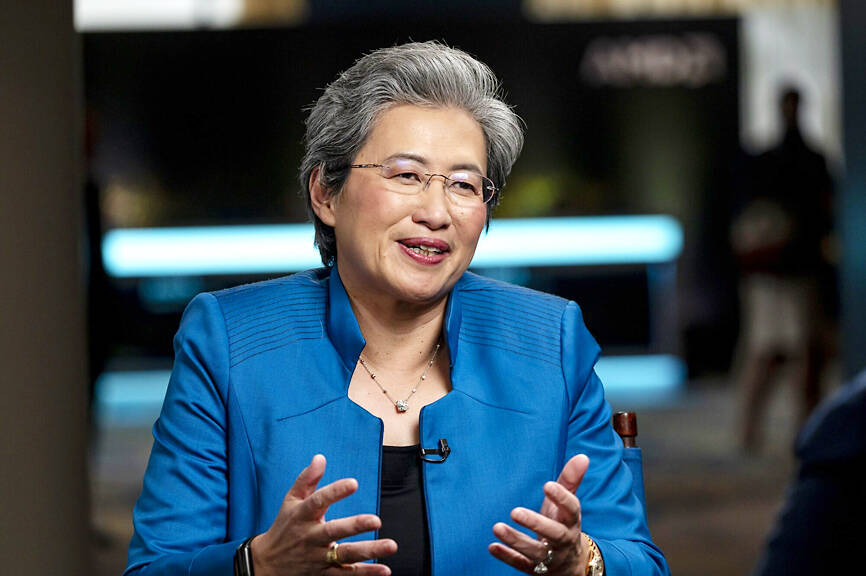Advanced Micro Devices Inc (AMD), taking aim at a burgeoning market dominated by Nvidia Corp, on Wednesday unveiled new accelerator chips that it said would be able to run artificial intelligence (AI) software faster than rival products.
The company introduced a long-anticipated lineup called the MI300 at an event in San Jose, California. AMD chief executive officer Lisa Su (蘇姿丰) also gave an eye-popping forecast for the size of the AI chip industry, saying it could climb to more than US$400 billion in the next four years.
That is more than twice as high as a projection AMD gave in August.

Photo: Bloomberg
Building AI systems that rival human intelligence — considered the holy grail of computing — is now within reach, Su said in an interview.
However, deployment of the technology is still only just beginning.
It would take time to assess the impact on productivity and other aspects of the economy, she said.
“The truth is we’re so early,” Su said. “This is not a fad. I believe it.”
AMD is showing increasing confidence that the MI300 lineup can win over some of the biggest names in technology, potentially diverting billions in spending toward the company.
Customers using the processors will include Microsoft Corp, Oracle Corp and Meta Platforms Inc, AMD said.
The new AMD chip has more than 150 billion transistors and 2.4 times as much memory as Nvidia’s H100, the current market leader, AMD said.
It also has 1.6 as much memory bandwidth, further boosting performance, it said.
Su said that the new chip is equal to Nvidia’s H100 in its ability to train AI software and much better at inference — the process of running that software once it is ready for real-world use.
While the company expressed confidence in its product’s performance, Su said it would not just be a competition between two companies. Many others will vie for market share, too.
At the same time, Nvidia is developing its own next-generation chips. The H100 is to be succeeded by the H200 in the first half of next year, giving access to a new high-speed type of memory. That should match at least some of what AMD is offering. And then Nvidia is expected to come out with a whole new architecture for the processor later in the year.

TECH BOOST: New TSMC wafer fabs in Arizona are to dramatically improve US advanced chip production, a report by market research firm TrendForce said With Taiwan Semiconductor Manufacturing Co (TSMC, 台積電) pouring large funds into Arizona, the US is expected to see an improvement in its status to become the second-largest maker of advanced semiconductors in 2027, Taipei-based market researcher TrendForce Corp (集邦科技) said in a report last week. TrendForce estimates the US would account for a 21 percent share in the global advanced integrated circuit (IC) production market by 2027, sharply up from the current 9 percent, as TSMC is investing US$65 billion to build three wafer fabs in Arizona, the report said. TrendForce defined the advanced chipmaking processes as the 7-nanometer process or more

China’s Huawei Technologies Co (華為) plans to start mass-producing its most advanced artificial intelligence (AI) chip in the first quarter of next year, even as it struggles to make enough chips due to US restrictions, two people familiar with the matter said. The telecoms conglomerate has sent samples of the Ascend 910C — its newest chip, meant to rival those made by US chipmaker Nvidia Corp — to some technology firms and started taking orders, the sources told Reuters. The 910C is being made by top Chinese contract chipmaker Semiconductor Manufacturing International Corp (SMIC, 中芯) on its N+2 process, but a lack

Who would not want a social media audience that grows without new content? During the three years she paused production of her short do-it-yourself (DIY) farmer’s lifestyle videos, Chinese vlogger Li Ziqi (李子柒), 34, has seen her YouTube subscribers increase to 20.2 million from about 14 million. While YouTube is banned in China, her fan base there — although not the size of YouTube’s MrBeast, who has 330 million subscribers — is close to 100 million across the country’s social media platforms Douyin (抖音), Sina Weibo (新浪微博) and Xiaohongshu (小紅書). When Li finally released new videos last week — ending what has

OPEN SCIENCE: International collaboration on math and science will persevere even if the incoming Trump administration imposes strict controls, Nvidia’s CEO said Nvidia Corp CEO Jensen Huang (黃仁勳) said on Saturday that global cooperation in technology would continue even if the incoming US administration imposes stricter export controls on advanced computing products. US president-elect Donald Trump, in his first term in office, imposed restrictions on the sale of US technology to China citing national security — a policy continued under US President Joe Biden. The curbs forced Nvidia, the world’s leading maker of chips used for artificial intelligence (AI) applications, to change its product lineup in China. The US chipmaking giant last week reported record-high quarterly revenue on the back of strong AI chip